
The French Revolution was a period of political and societal change in France that began with the Estates General of 1789, and ended with the coup of 18 Brumaire in November 1799 and the formation of the French Consulate. Many of its ideas are considered fundamental principles of liberal democracy, while its values and institutions remain central to modern French political discourse.
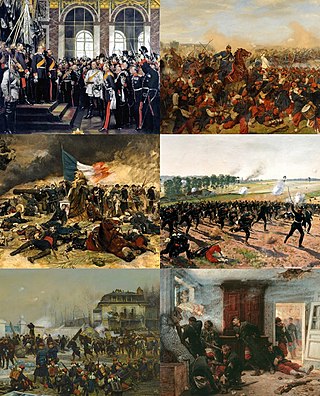
The Franco-Prussian War or Franco-German War, often referred to in France as the War of 1870, was a conflict between the Second French Empire and the North German Confederation led by the Kingdom of Prussia. Lasting from 19 July 1870 to 28 January 1871, the conflict was caused primarily by France's determination to reassert its dominant position in continental Europe, which appeared in question following the decisive Prussian victory over Austria in 1866. According to some historians, Prussian chancellor Otto von Bismarck deliberately provoked the French into declaring war on Prussia in order to induce four independent southern German states—Baden, Württemberg, Bavaria and Hesse-Darmstadt—to join the North German Confederation; other historians contend that Bismarck exploited the circumstances as they unfolded. All agree that Bismarck recognized the potential for new German alliances, given the situation as a whole.
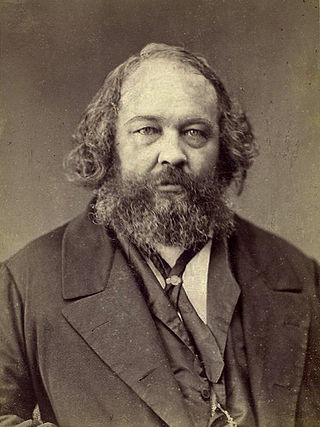
Mikhail Alexandrovich Bakunin was a Russian revolutionary anarchist. He is among the most influential figures of anarchism and a major figure in the revolutionary socialist, social anarchist, and collectivist anarchist traditions. Bakunin's prestige as a revolutionary also made him one of the most famous ideologues in Europe, gaining substantial influence among radicals throughout Russia and Europe.

The Paris Commune was a French revolutionary government that seized power in Paris from 18 March to 28 May 1871.

The Society of the Friends of the Constitution, renamed the Society of the Jacobins, Friends of Freedom and Equality after 1792 and commonly known as the Jacobin Club or simply the Jacobins, was the most influential political club during the French Revolution of 1789. The period of its political ascendancy includes the Reign of Terror, during which well over 10,000 people were put on trial and executed in France, many for political crimes.
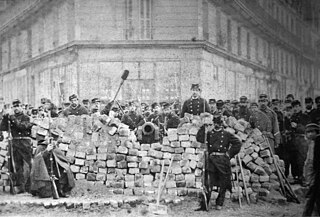
The Communards were members and supporters of the short-lived 1871 Paris Commune formed in the wake of the French defeat in the Franco-Prussian War.

Louis Jean Joseph Charles Blanc was a French socialist politician, journalist and historian. He called for the creation of cooperatives in order to guarantee employment for the urban poor. Although Blanc's ideas of the workers' cooperatives were never realized, his political and social ideas greatly contributed to the development of socialism in France. He wanted the government to encourage cooperatives and replace capitalist enterprises. These cooperatives were to be associations of people who produced together and divided the profit accordingly.

Olympe de Gouges was a French playwright and political activist. She is best known for her Declaration of the Rights of Woman and of the Female Citizen and other writings on women's rights and abolitionism.
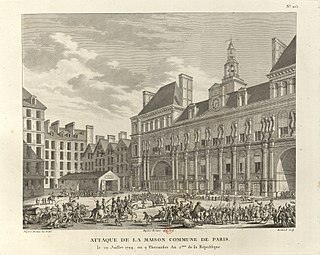
The Paris Commune during the French Revolution was the government of Paris from 1789 until 1795. Established in the Hôtel de Ville just after the storming of the Bastille, it consisted of 144 delegates elected by the 60 divisions of the city. Before its formal establishment, there had been much popular discontent on the streets of Paris over who represented the true Commune, and who had the right to rule the Parisian people. The first mayor was Jean Sylvain Bailly, a relatively moderate Feuillant who supported constitutional monarchy. He was succeeded in November 1791 by Pétion de Villeneuve after Bailly's unpopular use of the National Guard to disperse a riotous assembly in the Champ de Mars.
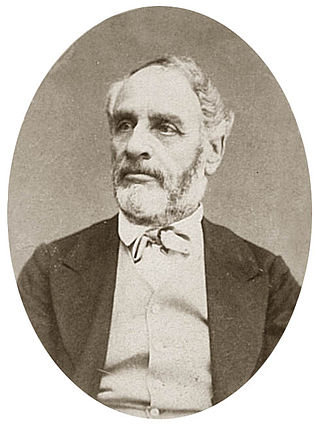
Louis Charles Delescluze was a French revolutionary leader, journalist, and military commander of the Paris Commune.
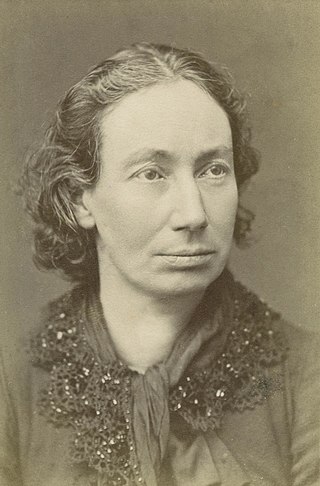
Louise Michel was a teacher and important figure in the Paris Commune. Following her penal transportation to New Caledonia she embraced anarchism. When returning to France she emerged as an important French anarchist and went on speaking tours across Europe. The journalist Brian Doherty has called her the "French grande dame of anarchy." Her use of a black flag at a demonstration in Paris in March 1883 was also the earliest known of what would become known as the anarchy black flag.

Théophile Charles Gilles Ferré was one of the members of the Paris Commune, who authorized the execution of Georges Darboy, the archbishop of Paris, and five other hostages, on 24 May 1871. He was captured by the army, tried by a military court, and was shot at Satory, an army camp southwest of Versailles. He was the first of twenty-five Commune members to be executed for their role in the Paris Commune.

The Vigilance Committee of Montmartre was a political association and provisional administrative organization established on the Rue de Clignancourt shortly before the Siege of Paris (1870–1871). Closely affiliated with the International Workingman's Association, its members had strong connections with the various anarchist and socialist tendencies of the time, particularly those represented by Karl Marx, Mikhail Bakunin, and Auguste Blanqui.
A workers' council, or labor council, is a type of council in a workplace or a locality made up of workers or of temporary and instantly revocable delegates elected by the workers in a locality's workplaces. In such a system of political and economic organization, the workers themselves are able to exercise decision-making power. Furthermore, the workers within each council decide on what their agenda is and what their needs are. The council communist Antonie Pannekoek describes shop-committees and sectional assemblies as the basis for workers' management of the industrial system. A variation is a soldiers' council, where soldiers direct a mutiny. Workers and soldiers have also operated councils in conjunction. Workers' councils may in turn elect delegates to central committees, such as the Congress of Soviets.
In Marxist philosophy, the dictatorship of the proletariat is a condition in which the proletariat holds state power. The dictatorship of the proletariat is the intermediate stage between a capitalist economy and a communist economy, whereby the post-revolutionary state seizes the means of production, compels the implementation of direct elections on behalf of and within the confines of the ruling proletarian state party, and institutes elected delegates into representative workers' councils that nationalise ownership of the means of production from private to collective ownership. During this phase, the administrative organizational structure of the party is to be largely determined by the need for it to govern firmly and wield state power to prevent counterrevolution and to facilitate the transition to a lasting communist society.
This chronology of the Paris Commune lists major events that occurred during and surrounding the Paris Commune, a revolutionary government that controlled Paris between March and May 1871.
In the history of labor, socialism, and revolutions, the historiography of the Paris Commune connects its 1871 events with the revolutions of 1848 and 1917. Historical interpretation of the Commune influenced subsequent revolutionary ideology and sociopolitical events. As of the late 20th century, there were two main historiographical schools of thought: the political interpretation, that the Commune was a patriotic eruption of fury in response to circumstantial hardship following the Siege of Paris; and the social interpretation, that the Commune was the result of macro socioeconomic forces boiling over, e.g., that it was a war of class struggle. Histories in the latter interpretation have used the Commune's events to make ideological points on behalf of their authors, either that the Commune was an illegitimate, criminal aggression, or that the Commune was the consummation of revolutionary momentum. Similarly, historians within both the political and social interpretations have disagreed as to whether the Commune was inevitable or accidental, a harbinger of the future or a sunset for revolutionary zeal.

The Lyon Commune was a short-lived revolutionary movement in Lyon, France, in 1870 and 1871 - republicans and activists from several components of the far-left of the time seized power in Lyon and established an autonomous government. The commune organized elections, but dissolved after the restoration of a republican "normality", which frustrated the most radical elements, who hoped for a different revolution. Radicals twice tried to regain power, without success.
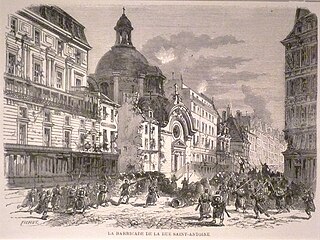
The semaine sanglante was a weeklong battle in Paris from 21 to 28 May 1871, during which the French Army recaptured the city from the Paris Commune. This was the final battle of the Paris Commune.
The Commune Council, simply known as the Commune, was the government during the 72-day Paris Commune in 1871. Following elections on 26 March, the municipal council adopted the formal name Paris Commune in its first session, implying a more revolutionary intent. The council declared itself and its name on 28 March at the Hôtel de Ville as a celebratory event. Their first proclamation followed the next day, reminding citizens of their autonomy and warning of civil war. The Commune was supported by the vast majority of Parisians. The Central Committee of the National Guard recognized and relinquished power to the Commune, but continued to organize as the "guardian of the revolution". The two groups exercised a de facto dual sovereignty.














